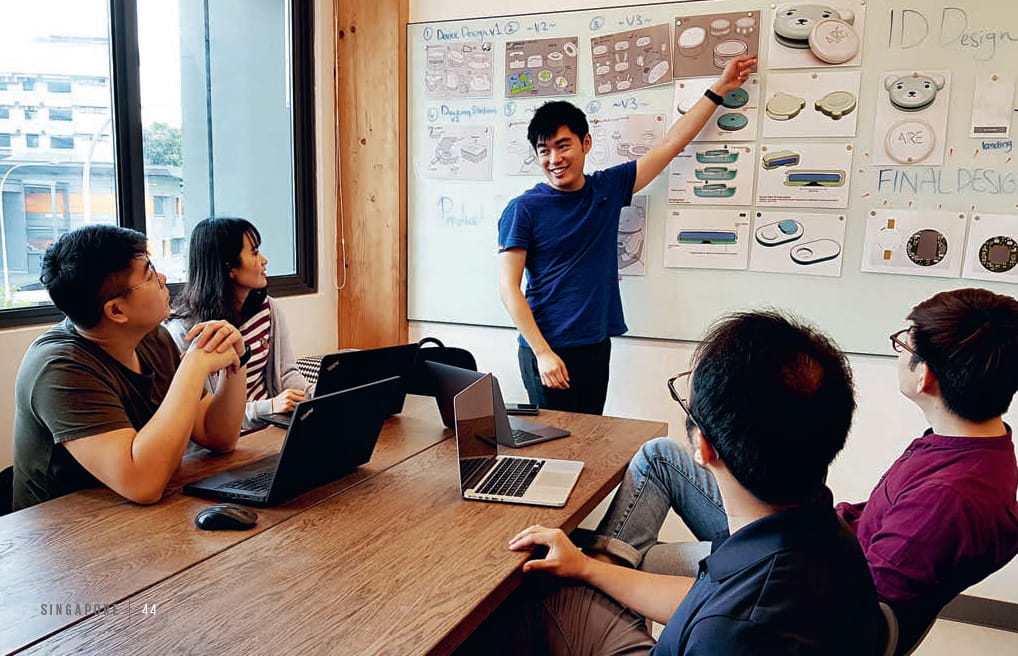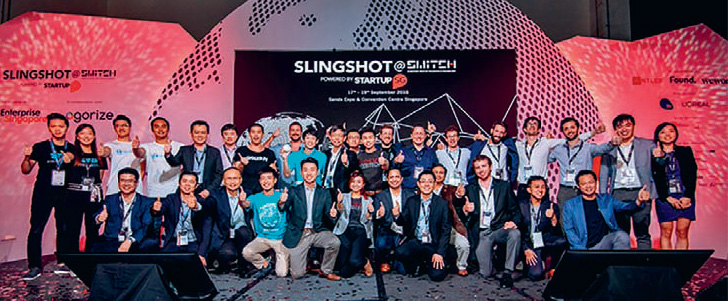Stories > A Breath Of Fresh Air
A Breath Of Fresh Air
Adrian Ang, the co-founder of AEvice Health, talks about his journey in developing the world’s first asthma monitoring device for children.
BY ZHOU XIJIE
drian Ang’s childhood ambition was to work in the aviation sector that would take him around the world. While he didn’t end up realising his original dream, the entrepreneur has already soared into unchartered territory with his company, AEvice Health.
Established in 2016, AEvice Health is a Singapore-based medical start-up that is behind AireSone, the world’s first asthma monitoring device designed for children.
AireSone comes in the form of a round device fastened to a hypoallergenic patch, which is then attached to a child’s chest. Once activated, the device tracks changes in a child’s cough intensity, respiratory rates and wheezing. It can send alerts to a mobile app to notify parents in the event of an asthma attack. Doctors can even use the data collected by AireSone to design more effective treatment plans.

Adrian Ang (in blue) with his team, who he says is given a high degree of autonomy and ownership of their work to help them grow.
“When a patient suffers from asthma, it is not possible for clinicians to be listening to his symptoms 24 hours a day. Therefore clinicians can only measure short spurts of critical information during clinic visits or collect retrospective data through verbal interview, which can be subjective,” he says.
“AireSone bridges this gap by listening and recording key data continuously, which can be used to identify respiratory conditions to assist clinicians in monitoring the efficacy and adjusting the treatment plan accordingly.”
A former asthma sufferer, Ang is well aware of the anxiety that a child with the condition can cause his parents and caretakers. “AireSone is specifically catered for children because they cannot articulate their condition well and are the most at risk,” he explains.
“I Have Had The Opportunity Of Meeting Various Start-up Founders From The Us, And Found That They Tend To Be Very Creative And Adventurous In The Way They Think.”
Adrian Ang, Co-Founder, AEvice Health
Ang first discovered that existing gaps in healthcare could be improved with the use of big data and smart algorithms when he was studying at the Nanyang Technological University in 2010. Having forged a close relationship with his mentor, Ser Wee, an associate professor at the School of Electrical & Electronic Engineering, the pair stayed in touch even after he had graduated and started working for his father’s construction company.
Six years later, while catching up over a cup of coffee, the duo casually chatted about creating a medical device for asthma patients. Things escalated quickly. That same year, the two men started AEvice Health.
While Singapore might be home to a thriving start-up population, the medical technology – or medtech – sector is one that few have dared to venture into. Ang recalls that one of his mentors even called him “mad” for wanting to delve into it.
“Attracting talent and having the right people to do the job is one of the major challenges in starting up a medtech company. As a company that develops hardware, software and artificial intelligence, we require people with highly specialised skill sets. However, many of them prefer to pursue their careers at multinational companies or research institutions, so it takes a lot of effort to entice them to join a start-up,” he explains.

Invented in Singapore, AireSone is a device that can be attached to a child’s chest to help with asthma management.
He also pointed out that medtech products also take much longer to get off the ground, as they are subjected to stringent certification and regulatory scrutiny. The process of developing such products also involves extensive research and development.
In order to hire the right talent, Ang personally vets all candidates to ensure they have the right skill sets as well as an inclination to learn. And because talent is so scarce, the company is focused on retaining them by offering a dynamic office culture.
“Here, we have a flat organisational structure where everyone is treated like a family member. In addition, we give our staff a high degree of autonomy so that they can take ownership of their work and grow with the company,” he says.
Another big challenge he faced was the fact that countries adopt different guidelines when it comes to diagnosing and treating asthma. In order to create a product that could be sold in different markets, Ang and his team spent countless hours doing research and conducting interviews with clinicians and asthma patients from around the world.
He has even participated in many asthma support groups for parents or sufferers on social media so as to better understand the challenges they face. Last year, he and his team set up a community group for parents with children suffering from respiratory conditions, so that they can support and learn from one another.
But it hasn’t been all work and no fun. In many ways, AEvice Health has become the plane that Ang has always wanted to fly, taking him on adventures that include accelerator programmes in different countries, tech start-up competitions such as Slush Singapore 2016, and even a reality television series by a local news channel called Start-UP. These experiences, he says, have allowed him to broaden his horizons and gain new perspectives on problemsolving from his global peers.
“I have had the opportunity of meeting various start-up founders from the US and found that they tend to be very creative and adventurous in the way they think. This taught me to consider new perspectives when it comes to problem-solving,” he says.
“During the Dubai 100 Accelerator programme, which conducts an intensive 100-day programme to help health tech firms scale their businesses, I also got to meet the founders of a few interesting startups from China. One of them was Modoo, which uses innovative passive technology to monitor unborn babies’ movement and heart rate. It allowed me to discover how hungry the Chinese are for success, especially in the technology sector. I must also add that they are a very resourceful and efficient people.”

Ang believes in learning new problem-solving perspectives by participating in international accelarator programmes and start-up competitions.
These revelations have helped him to reflect on the nature of Singaporeans and how they can be better entrepreneurs.
“Singaporeans are very independent, and sometimes this may work against them as they might be too shy to ask for help when they need it,” he reflects. “I strongly encourage entrepreneurs to ‘thicken their skins’ and get as much help as possible!”
Ang’s start-up adventure, it appears, has only just begun. AireSone, which achieved an impressive 85 per cent accuracy rating in pre-clinical trials, is currently pending clearance from health authorities and is slated to be sold in pharmacies by 2022. The device is expected to cost between S$300 and S$500.
“Attracting Talent And Having The Right People Do The Job Are Major Challenges Faced By A Medtech Startup.”
“Today, our scientific advisory board comprises international key opinion leaders in the field of asthma. We all believe that our technology would one day become the new standard of care for chronic asthma disease. This is because AEvice Health has the technology to address gaps in the current asthma management ecosystem,” he says.
“There are many areas where our technologies can be applied, such as in chronic obstructive pulmonary disease and sleep apnoea. But AEvice Health is focusing on children at the moment because they are the future. Their well-being will impact the growth and development of any country.”
